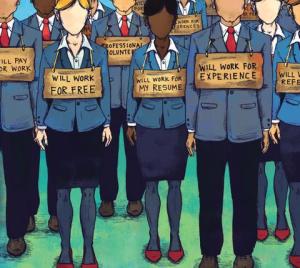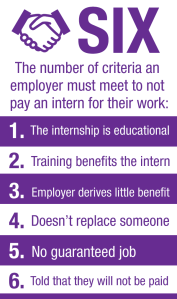
Two weeks ago, I discussed the documentary Generation Jobless, where among many of its critical critiques it fit in that Millennial interns are rarely placed in paid or even legal internship positions, with many of them just being cycled through the “system” under the guise of acquiring experience. As Marcus (2014) alluded to in an earlier comment, many unpaid internships do not meet the requirements of the Ontario’s Employment Standards Act (ESA) and they also place youth in a precarious situation where they are “working” for a company with no promise of a career afterwards.
Just to put things in perspective, according to the ESA, “if you perform work for another person or a company or other organization and you are not in business for yourself, you would be considered to be an employee, and therefore entitled to ESA rights such as the minimum wage” (Ontario Ministry of Labour, 2013). The only exemption to this rule is if an unpaid intern is being “trained,” otherwise an intern is considered an employee unless all of the six conditions are met below:

How rarely do we perform internships, which are of no economic benefit for the employer?
When I was an intern I was trained on different pieces of equipment and then immediately began applying these skills to complete work for the company. Mind you the labour laws between different provinces are different, but still this is a cause for alarm when in Ontario there are 300,000 unpaid internships and most of them are illegal (the gazette, 2013). The question is are unscrupulous employers taking advantage of students and recent graduates who when faced with mounting debt and bills are willing to trade job security for “valuable” “real life experience?” Internships may give you experience but it’s never enough to meet those “minimum two years of job experience” that plagues any job search.
On the website Adecco (2013) they initially appear to point out the Millennials are a valuable talent pool to be tapped into, at least until you scroll through the article and see phrases like:
- “Offer unpaid opportunities for youth to work on short-term projects. They’ll get some valuable experience, and you’ll get certain tasks done that always seem to fall on the backburner.”
- “Volunteer opportunities that are not project-based, such as inviting youth to organize certain events, involve a bit more investment.”
- “When you take on interns, make sure you give them work that makes them feel they’ve contributed to your organization. The more you treat them as actual employees, the better it is for them and for you since some of them may make fantastic future coworkers.”
I suddenly feel exploited, a pack mule to shove unwanted or additional work onto while grooming me for potential future menial employment. Not being covered by ESA means that you are not protected under workplace safety laws, you are not entitled to minimum wage, and you have no control over the set hours of work.

It has also been pointed out that these figures are not included by Statistics Canada as unemployed, which means we have a much greater percentage of my generation working for nothing than the previously estimated 16.4%.
In December 2013, the Wynne government began to outline plans to reform labour laws to help unpaid interns aided by Labour Minister ,Yasir Naqvi; but what is concerning were his words, “I was very concerned, too, when I found out” (thestar.com, 2013).
Did he not know!?
Had nobody told him of this looming crisis recognized as early as 2008?
One reason it might not have been communicated is that for better or worse, governments are highly bureaucratic organizations, set to follow their own political agendas. On top of that we have three levels of government, Federal, Provincial and Municipal, who are responsible for looking out for our welfare and “sometimes” communication between different levels of government and within different government officals just doesn’t occur. From this brief description it is clear that governments still employ an almost Classical Theory of communication.
Communication must trickle downwards from the top authority to the bottom (the scalar chain) and this undisputed hierarchy is bound to create silos not only within provinces but between provinces, which lose or never receive information like a badly played game of broken telephone. At times it feels like we, the Millennials, are not being heard because for any change to be set in motion because it is always someone else’s problem or it is someone else “higher up” who makes that decision.
Crises develop when no one listens and with unpaid internships, rising tuition fees, declining job opportunities it seems more than likely that unless all three levels of government respond and work together to overcome this broken one-way system of communication we could be headed for a very real crisis.

Resources
Adecco. (2013). Make Way for the Millennials – or Else. Retrieved February 10, 2014, from http://www.adecco.ca/articles/Make-Way-for-the-Millennials-%E2%80%93-Or-Else.html?id=170&url=/en/knowledge-centre/articles/pages/forms/allitems.aspx&templateurl=/en/knowledge-centre/pages/article.aspx
Guido, M. (2014, January 23). What are we Saying? That there’s a job crisis, but we’ll fix it. (A look at Ontario’s response to youth unemployment). [Msg 2]. Message posted to https://originalovp.wordpress.com/2014/01/23/is-there-a-job-crisis/#more-10
Ontario Ministry of Labour. (2013). Are unpaid internships legal in Ontario?. Retrieved February 4, 2014, from http://www.labour.gov.on.ca/english/es/pubs/internships.php
PBS. (2012). The uneven playing field of unpaid internships. Retrieved February 10, 2014, from http://www.pbs.org/wnet/need-to-know/opinion/the-uneven-playing-field-of-unpaid-internships/13785/
the gazette. (2013). Unpaid internships come at a steep price for students. Retrieved February 10, 2014, from http://www.westerngazette.ca/2013/09/11/unpaid-internships-come-at-a-steep-price-for-students/
thestar.com. (2013). Unpaid Inters: what the new rules would cover. Retrieved February 10, 2014, from http://www.thestar.com/news/gta/2013/12/04/unpaid_interns_what_the_new_rules_would_cover.html#
topuniversities.com. (2014). Unpaid Internships still a problem for students in 2014. Retrieved February 10, 2014, from http://www.topuniversities.com/student-info/university-news/unpaid-internships-still-problem-students-2014
youth and work. (2012). Youth and Work on CBC’s The Current Talking About Unpaid Internships. Retrieved February 10, 2014, from http://www.youthandwork.ca/2012/05/youth-and-work-on-current-talking-about.html
Zaremba, A. J. (2010). Crisis communication: Theory and practice. Armonk, NY: M.E. Sharpe.
Hi Olivia,
Another great blog post! I thought you explained the internship and government communication crises well, tying them together through the theme of ethical employment. To be honest, before I started this program I was ignorant of the internship crisis – unpaid labour for company benefit. I was shocked to read and learn that so many of our generation are being ‘brought on’ to companies under the guise of ‘gaining experience’, only to have their work exploited. Equally shocking is the lack of media coverage of the issue and how the government is failing to communicate facts to the public. Though it may be a breakdown in communication it may also be a clever tactic not to arouse suspicion. Such a large issue involving rights and ethics may be handled with stealth out of fear of a legal backlash.
Interesting! Thanks for the insights.
Jill
Really great post Olivia, I appreciate all of the insight that you have provided on this topic. What I have come to realize is that MUCH of the un-paid work I have done over the years does not meet the six criteria that you have stated above, I should have been paid. That being said, I have a hard time feeling exploited or resentful. I have gained invaluable experience in my field that I would not have had access to had I attempted to apply for a paid position. I am extremely grateful for being afforded the opportunity to gain hands-on experience and it has effectively steered me in the right direction for my future.
Great response, I completely agree. I think we’ve all done internships where the “legality” has not exactly been to standard but have accepted no pay for the invaluable experience. There’s no way I personally would have learnt as much as I have if I didn’t work for free. I think the challenge is faced when you try to monetize or quantify that experience. Can an internship be considered the same as doing the same job as an actual employee?